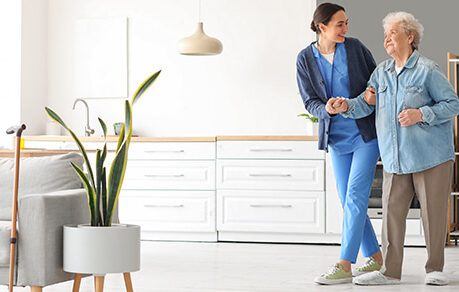
The biggest threat today is the fast-spreading coronavirus. Causing dread all over the world. Coronavirus affects people of all age groups. However, coronavirus more likely affects older people with pre-existing health issues such as diabetes, heart disease and asthma. Seniors with health conditions are reported to be more vulnerable to the virus. The weakening of the immune system with age can be another factor, why elders are more vulnerable to the virus. The affected organs of an elderly with a health condition makes it difficult to fight against COVID19 infection, the disease caused by a coronavirus. 31 percent of the people affected by the virus are 60 years and older, and one death is reported to be caused by COVID19 [1].
COVID-19 a Pandemic:
The world health organization has declared coronavirus as a pandemic. Although the cases of COVID19 are low in Canada this might change because all over the world it just keeps spreading more and more. Therefore, we all must educate ourselves with the guidelines and follow them to keep ourselves safe.
COVID19 is a respiratory disease, which spreads when you touch something, which has a virus on it. When you touch your face, eyes or nose, the infection enters the respiratory tract and spreads insides you. It spreads through sneezing and coughing, the droplets that enter through the respiratory tract and cause infection.
Guidelines:
Therefore, the elderly are advised as well as people of all age groups to avoid travelling to the infected areas and if they have gone there, they should isolate themselves from others for 14 days. The disease spread through content so does not touch others or your own face, eyes or nose. Wash hands frequently for 30 seconds with soap. Avoid crowded areas and wear a mask when you are outside. Stay at home and avoid having visitors at your place. It is best for both your and their safety.
Monitor yourself for symptoms such as cough, sore throat, sneeze and fever, if symptoms appear then stay at home, avoid contact with other family members and contact public health facilities. Canada’s health facilities are trying their best to contain the virus.
Precautionary measures:
- Wash hands for at least 20 seconds with soap, use alcohol-based hand sanitizer.
- Stay at least five to ten feet away from other individuals.
- Cover your mouth with the inside of your elbow or tissue paper while coughing or sneezing.
- Stay at home and avoid contact.
- If the symptoms appear, contact the public health facility.
References
| [1] | [Online]. Available: https://www.canada.ca/en/public-health/services/diseases/2019-novel-coronavirus-infection.html. |
Baby Boomers who born between 1946 and 1964; are heading towards retirement in groups (approximately 10,000/day). Apart from the aging element of this iconic group, there are many factors that need to be addressed like their lack of preparation for their later years, insufficient financial resources, and now-and-then employment cycles. Considering this, there is a calamity that is expected to come across in the next 10 years.1 These retirees have to look ahead to future living arrangements with concern. Baby boomers are known for their independent nature, and aging doesn’t change that. Canada’s baby boomers also see themselves staying in their own homes paying for the home care as the best available option or at least in their own communities. A survey released by RBC found that 83% Baby Boomers retirees would choose staying at home with care as needed. They far preferred that option to2:
- Living in a retirement residence with care provided (50 per cent).
- Living with family who could assist with home care (24 per cent).
- Receiving care in a long-term care facility (14 per cent).
Amalia Costa, RBC Head of Retirement Strategies and Successful Aging, said in a press release “”Remaining in familiar surroundings – in a home of their own, in their current neighborhood and close to family and friends is definitely how Canadian Boomers wish to live when future health changes occur.”
Another study revealed that about 91% Canadian Baby Boomers retirees said that they want to stay in their home or in their neighborhood and live independently as long as possible. The baby boomers’ desire to stay in their home is not strange as most seniors, today, aspire to stay in their home as long as possible. Gone are the days when most seniors will move to a retirement living away from their communities. The number of home-care recipients’ elders in Canada has drastically increased in the past 10-20 years. So the question arises how this requirement of in-home stay will be met? This generates the option of private home care facilities for the families and their seniors.
Baby Boomers Independent Retirement Living:
As more baby boomers enter retirement, like other seniors, they require a lot of factors to be considered upon for staying independently and healthy at their own homes. There are several options that support them to live an independent life; a few names as follows:
- Caregiver from a Healthcare Provider:
Although, there are retirement facilities, nursing homes and other accommodation and care options for seniors, but the wish of baby boomers to stay home emerges the option of hiring a caregiver from a home care business. This option helps them to stay at their own place independently as the caregiver from a professional healthcare provider can facilitate them in the following supportive needs:
- Assistance with instrumental activities of daily living (IADLs). This includes help with things like shopping or cleaning.
- Assistance with physical activities of daily living (ADLs). This includes activities such as eating, bathing, or moving around.
- High-Tech Support:
As many baby boomers enter retirement, they see their homes get a high-tech makeover based on the technological advancements and innovations taking place in the current era. These technological innovations are revolutionizing the healthcare industry and the aim of these upgrades is to allow aging population to stay in their homes with independent living for longer period of time. Some of the options that can assist baby boomers seniors live at their own can be;
- Smart Home Devices
- Virtual Reality
- Telemedicine
- Fall Prevention Tools
- Medication Management
- Upgraded Home and Bath
Studies have shown that Homes which are unable to accommodate some of the needs associated with growing age such as reduced mobility and lower muscle strength, can pose to more risks for the elders who want to stay independent at their place. An important aspect of having an independent life lies in assessing your home whether it will meet with your needs now and into the future. If you’re planning your home for the future, or considering an upgraded renovation, have a proper analysis to determine the design features that can help you to accommodate your aging in place needs and live your retirement life independently.
According to a research by Centers for Disease Control (CDC), the bathroom is the area of the house in which adults, despite of age, are most likely to sustain an injury. An ADA-compliant bathroom can make it possible for the seniors to live independently and safely in their home. Here are a few tips to keep in mind while upgrading your bathroom to have an independent living: 2
- The grab bars should be doubled of towel racks in density so that it can provide extra support.
- Comfortable height toilet seats should be introduced.
- Arrangement of improved and additional lighting
- Sink/shower/tub lever handles can offer a more user-friendly experience than knobs.
- Doorways should be widened in order to accommodate walkers and wheelchairs.
- Slip-resistant flooring in the bathtub and shower can be supportive.
- Modern walk-in-bathtubs can offer comfort and safety without sacrificing style.
- Future Financial Planning:
As it is known that baby boomers in general terms are healthier than their parents, are more active, have fewer children, are better educated, and are more likely to own their home. Hence living independently in their own homes will require the homeowners to think forward and to do something that we are not very good at; to plan for the future. According to a research, the key to successful planning for the future lies in determining how we want to live tomorrow. We know that senior living can seem financially intimidating, but if you’re already thinking about how to afford the care, you’re ahead of the game. Here are a few financial steps that can help to have an independent retirement living:
- Designate Primary Accounts
- Pay off Debts
- Hiring a Financial Planner
- Don’t rely on Social Security only
- Look for Annuities
References:
- https://www.investopedia.com/articles/personal-finance/032216/are-we-baby-boomer-retirement-crisis.asp
- https://www.cbc.ca/news/business/canadian-boomers-want-to-stay-in-their-homes-as-they-age-
- https://www.rebath.com/7-tips-for-baby-boomers-preparing-to-age-in-place/

